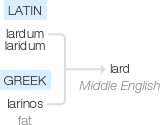Lard
Middle English (also denoting fat bacon or pork): from Old French ‘bacon’, from Latin lardum, laridum, related to Greek larinos ‘fat’.
wiktionary
From Middle English lard, from Old French lard(“bacon”), from Latin lārdum, lāridum(“bacon fat”).
From Middle English larden, from Old French larder and Medieval Latin lārdō.
etymonline
lard (n.)
late 14c. (possibly early 13c.), "rendered fat of a swine," from Old French larde "joint, meat," especially "bacon fat" (12c.), and directly from Latin lardum "lard, bacon, cured swine's flesh" (source also of Spanish, Italian lardo), probably cognate with Greek larinos "fat," laros "pleasing to the taste."
lard (v.)
"prepare (meat) for roasting by inserting pieces of salt pork, etc., into it," mid-14c., from Old French larder "to lard, cook with strips of bacon fat" (12c.), from larde "bacon fat" (see lard (n.)). The inserted bacon strip is a lardon or lardoon (from French). Figuratively, of speech or writing, "intersperse with material by way of ornament or improvement," from 1540s. Related: Larded; larding.
